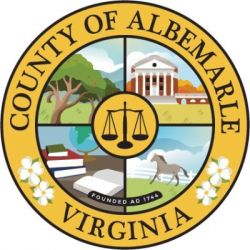Public Safety Communications Officer The Charlottesville-UVA-Albemarle County Emergency Communications Center (ECC) Full-Time or Part-Time, 12 months
Non-Exempt, Public Safety Pay-scale
Benefits-Eligible
THE CHARLOTTESVILLE-UVA-ALBEMARLE COUNTY EMERGENCY COMMUNICATIONS CENTER (ECC) The Emergency Communications Center (ECC) provides all emergency communications services for Albemarle County, the City of Charlottesville, and the University of Virginia. The ECC receives all 9-1-1 calls in the area and serves as the central dispatch for the three local police departments, three rescue squads and fire calls. The ECC is a nationally recognized center, having earned CALEA Accreditation as well as being designated as an APCO National Certified Training Program and Virginia Accredited Emergency Medical Dispatch Communications Center.
The Public Safety Communications Officer The Public Safety Communications Officer (PSCO) is a skilled communications professional, performing work that is core to the health, safety, and well-being of our communities. As the “first, first responder”, the PSCO receives, processes, dispatches, and manages emergency and non-emergency requests for service from the public, law enforcement, and fire/rescue communities in a fast-paced, technology-rich environment.
The PSCO is assigned to work at the Charlottesville-UVA-Albemarle County Emergency Communications Center (ECC), a consolidated primary public safety answering point which provides emergency communications services for Albemarle County, the City of Charlottesville, and the University of Virginia. The ECC receives all 9-1-1 calls in the area and serves as the central dispatch for all regional law enforcement, fire, and EMS agencies. The ECC is a nationally recognized center, having earned CALEA Accreditation as well as being designated as an APCO National Certified Training Program and Virginia Accredited Emergency Medical Dispatch Communications Center. The PSCO exercises judgement in establishing response priorities, while directing and coordinating field responders. The PSCO anticipates community and responder needs to ensure effective utilization of available resources. The PSCO is often called to triage and manage incidents, providing care to people in emergency situations, until field responders arrive on scene, and performing 9-1-1 telecommunications work under frequently stressful and emotionally challenging conditions.
This position includes progressive knowledge, skills, abilities, and essential functions in the following areas: - PSCO-I (Call-taking) A 9-1-1 telecommunicator who receives and processes emergent and non-emergent requests for assistance originating from telephone calls, text messages, videos, and other methods, providing pre-arrival and post-dispatch instructions.
- PSCO-II (Call-taking/Dispatch) A 9-1-1 telecommunicator who dispatches for one assigned area of focus (law enforcement or fire/EMS), in addition to call taking;
- PSCO-III (Call-taking/Multi-Disciplinary Dispatch) A 9-1-1 telecommunicator who dispatches and manages system status of all disciplines (police, fire/EMS, and others), in addition to call taking.
THE EXPECTATIONS
Essential functions and responsibilities of Public Safety Communications Officer include, but are not limited to, the following:- PSCO-I (Call-taking):
- Receives emergency and non-emergency requests for service by telephone, text message, video, or other methods and determines appropriate response according to location and nature of problem and procedures of the department(s).
- Provides pre-arrival and post-dispatch instructions.
- Provides information to callers when in-person response by police, fire, or rescue agency is not warranted.
- Transfers calls to Poison Control Center, surrounding jurisdictions' Emergency Communications Centers, or 9-8-8/Mental Health Crisis Centers; monitors transferred telephone calls to ensure pick-up and appropriate response.
- Operates and enters information into the computer aided dispatch system.
- Places outgoing calls to partner agencies to coordinate emergency and non-emergency response.
- Completes required monthly training to ensure special procedures are reviewed with supervision.
- Operates other related equipment, including voice recording units, telecommunication device for the hearing impaired, RIOS Interoperability System, Backup Telephone System, and NG-911 telephone system.
- May assist with the training of new employees to include classroom and continuous on the job training.
- Performs other related duties as required.
- PSCO-II (Call-taking/Dispatch):
- Performs all essential functions of a PSCO-I.
- Operates and monitors multiple emergency radio frequencies for an assigned area of focus (Fire/EMS or Police).
- Ensures that all call information is relayed to the responders and entered into the CAD record.
- Maintains communications with responding emergency units to assist them in any manner necessary to complete proper response.
- Relays vital information to field responders.
- Prioritizes, dispatches, documents response and disposition of emergent and non-emergent requests for service, according to policy and procedures.
- Operates and monitors local, state, and national weather and disaster warning and mass-notification systems.
- Operates and monitors national and statewide criminal information network teletype system if area of focus is Police (not applicable for Fire/EMS).
- Implements emergency call-out procedures as appropriate.
- PSCO III (Call-taking/Multi-Disciplinary Dispatch):
- Performs all essential functions of a PSCO-II.
- Maintains proficiency and ability to work all PCSO roles within the ECC including dispatch and monitoring response activities for police, sheriff, fire, EMS, mental health crisis teams, security and others.
- Manages the system status of assigned field response agency and keeps chiefs, commanders, and directors informed of notable changes.
- Operates and monitors multiple emergency radio frequencies and talk groups.
- Performs related tasks as required.
THE QUALIFICATIONS
Education and Experience
Graduation from high school or possession of a GED. Prior work experience involving public contact and/or with an emergency response agency preferred.
PSCO-I is an entry-level position and requires no prior emergency communications experience.
PSCO-II requires demonstrated mastery (typically, minimum of one year) of PSCO I core functions and responsibilities.
PSCO-III requires demonstrated mastery (typically, minimum of two years) of PSCO I and PSCO II core functions and responsibilities.
Prior experience in like roles will be evaluated on a case-by-case basis and may be utilized for PSCO-II/III placement. This position may be hired as PSCO I, II, or III depending on agency needs and vacancy.
Special Requirements: Completion of appropriate training prescribed by the Commonwealth of Virginia for this level of position. Possession of a valid driver's license issued by the Commonwealth of Virginia. Ability to obtain and maintain EMD, EFD, and EPD through International Academy of Emergency Dispatch certification within 90 days of hire.
Knowledge, Skills and Abilities
General knowledge of the methods of operation of telecommunication equipment and systems, ability to work well in emergency situations; ability to work well in a stressful environment, ability to work shift work; ability to work well with the public, responder agencies and co-workers; general knowledge of the geography, street and road systems and location of landmarks in the County, City and University of Virginia; ability to communicate effectively, both verbally and in writing, to convey information accurately, and to speak distinctly in stressful situations; ability to receive and process text, video, and other multi-media information which may contain sensitive, explicit, or emotionally challenging content; courtesy; tact; demonstrated ability to complete common job tasks while using a computer and multi-tasking; ability to satisfactorily complete the Communications Academy, Virginia Criminal Information Network/National Crime Information Center, Cardio Pulmonary Resuscitation for Telecommunicators; ability to successfully complete one year probationary period; ability to anticipate needs of field responders using guidance provided by policy and procedure.
Extensive training is completed during initial months of employment, followed by a period of close supervision until a degree of proficiency is demonstrated in each phase of work. After the training period is completed, work is performed under regular supervision.
THE PHYSICAL CONDITIONS AND NATURE OF WORK CONTACTS
Duties are normally performed in a public safety emergency communications center setting, under frequently stressful and emotionally challenging conditions, primarily sitting or standing for extended periods of time at a telecommunications console position utilizing radio, telephone, and computer equipment. Hours of operation are 24 hours a day, 365 days a year. The employee is primarily scheduled for shift work hours which normally are 2-3-day periods consisting of 12-hour shifts. Work periods may have permanent or rotating days off, frequently requiring the employee to work holidays, evenings, or nights. The employee in this position is considered essential personnel and falls under Albemarle County AP-4 and in addition, is subject to working overtime, being held over, or called back for disasters, local emergencies, or special events. Frequent contact with the public, police, sheriff, security, fire, emergency medical service and mental health providers is necessary. Occasional contact with other federal, state and local government agencies is required. These contacts may require considerable skill in diplomacy, tact, or discretion., tact or discretion.
THE SALARY RANGE
Both full-time and part-time positions available. The salary range for this position is based on the public safety pay-scale, with a total annualized pay range of approximately $48,288-$98,302 (PSCO I Step 1 - PSCO III Step 30) for a full-time position working 2184 hours per year. Officers are also eligible for shift differential pay, and education stipends for completed Associate’s Degree of $1,000 per year and Bachelor’s Degree of $2,000 per year. Starting offer is based on applicable experience. The position also provides excellent benefits including 12 paid holidays, paid vacation and sick leave, health insurance options with employer contribution, employer-paid life insurance, VRS retirement, and continuing education/training opportunities.
Deadline for applications: Position open until filled
Virginia Values VeteransAlbemarle County is a Certified V3 organization.
EOE/EEOAlbemarle County is an equal employment opportunity employer, and does not discriminate against any group or individual on the basis of race, color, religion, sex, sexual orientation, national origin, age or disability in regards to any aspect of employment policy and practice: recruitment, testing, selection, assignment, pay, conditions of work, training, leave, overtime, promotion, discipline, demotion, and separation.



